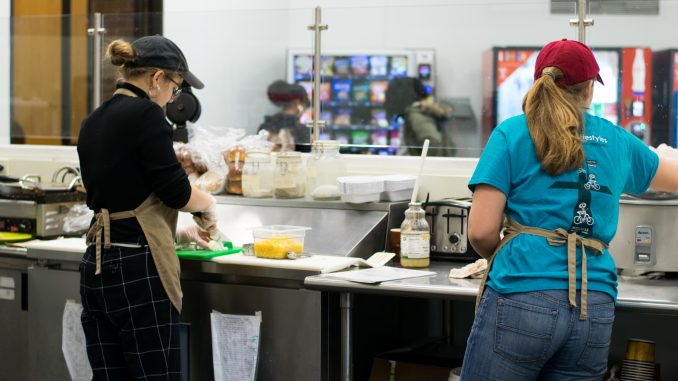
The Rad Dish Co-op Café is now independent of Temple’s food service provider since the university transitioned to Aramark.
The student-run cafe in Ritter Annex, known for its vegan and gluten-free options, does not purchase its dry food orders through Aramark like it did with Sodexo. Sodexo would allow Rad Dish to apply its dry foods order to Sodexo’s orders because Sodexo made orders frequently.
Orders would sometimes be filled incorrectly because Sodexo’s orders were so large, Rad Dish employees said. But Aramark did not approach Rad Dish to work with the co-op during its incoming 15-year contract with the university.
Rad Dish’s general manager and senior criminal justice major Stephanie Hudson said the switch to Aramark is positive for the co-op because now the students are completely in charge of what they order through the new supplier.
This solves the issues with ordering through Sodexo like occasional mistakes and inconsistencies with orders, she added. Members are unsure if the cost has risen for purchases since the cafe began to order its own food.
“The switch to Aramark has really had no impact on Rad Dish, other than having to switch to a new food supplier,” she added.
Rad Dish formerly purchased its locally sourced dry food, like rice, quinoa, chips and teas, through Sodexo from United Natural Foods Incorporated.
Since Aramark hasn’t aided transactions between Rad Dish and UNFI, it now gets its UNFI order through the UNFI’s delivery service Honest Green. Aramark and Rad Dish do not work together at all, Hudson said.
In an interview with The Temple News in October, Aramark’s resident district manager Endri Baduni said the food service provider brought its sustainability platform, Green Thread, to the university. This platform focuses on waste reduction and locally sourced foods, Baduni added.
Aramark declined to comment on if it works with Rad Dish and referred The Temple News to the Office of Sustainability.
Officials from the Office of Sustainability said Aramark was willing to work with Rad Dish, but ordering its dry goods through the Honest Green supplier is more efficient for the co-op.
“We have more transparency in pricing and more regularity in when the order is placed,” said Veronica Rohach, the Office of Sustainability’s Rad Dish liaison and coordinator.
High Point Cafe, a local Philadelphia coffee shop that makes a variety of gluten-free baked goods, has recently become the co-op’s baked goods supplier. Hudson said more students are coming to Rad Dish for the gluten-free options.
To become more accessible to students, Rad Dish is also fundraising through OwlCrowd, Temple’s crowdsourcing website, to purchase a machine that can take Diamond Dollars. This machine costs $900 and the cafe has raised more than $500 so far, according to the crowdsourcing site.
Rad Dish hopes to allow students to use meal swipes in the future, too, Hudson said.
“To get put into the meal swipe system would be an even bigger hurdle,” she added.
Rad Dish’s menu ranges from coffee and tea to sandwiches and pastries.
Rad Dish has been open for nearly three years. Happy Hippy, another on-campus natural food restaurant, was in the Student Center’s food court but closed when the university switched to Aramark.
Rad Dish is the only student-run organic food location on Main Campus, and there are few other restaurant options for sustainable foods nearby.
Hudson said students aware of the Rad Dish are supportive of Temple having a sustainable, student-run restaurant.
“We are getting an uptick in students coming to Rad Dish mainly due to the options of eating we have,” Hudson said. “People are starting to know about it and starting to spread the word.”



Be the first to comment